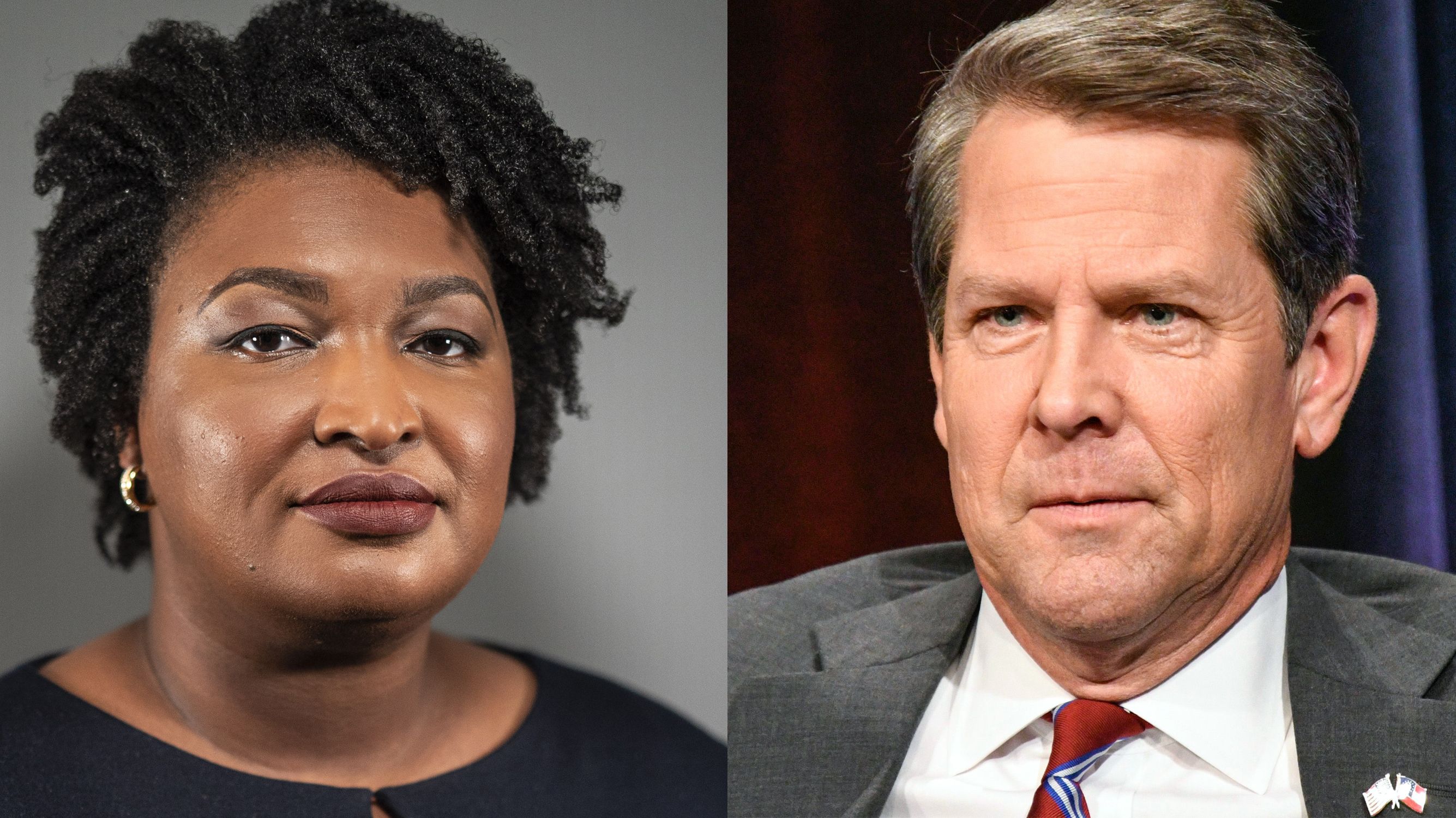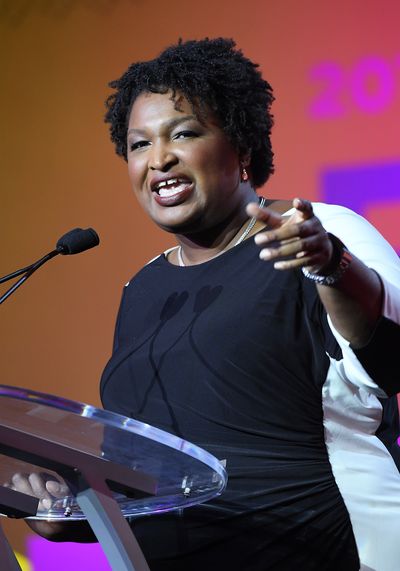Stacey Abrams on Why Survivors Don't Report—And Why We Must Believe Them Anyway
The woman at the heart of Georgia's explosive gubernatorial race has strong words on the subject.


One year after #MeToo, we're once again talking about whether we must believe women—and whether our representatives must, too. For a handful of politicians hoping for glory in the midterm elections, the allegations of sexual assault against Supreme Court nominee Brett Kavanaugh have forced them to take a side on a thorny issue. The ensuing political divide is starkly on show in Georgia, where gubernatorial candidate Stacey Abrams—a lifelong progressive and social justice advocate, who wrote on Twitter yesterday that she chooses to believe survivors—is up against Brian Kemp, an anti-choice conservative who pointed a gun at his teenage daughter's suitor in a campaign ad, and has thus far refrained from retracting his endorsement of Kavanaugh.
Speaking to MarieClaire.com in New York's The Wing co-working space Monday, Abrams clarified her position, noting that she was aware of the myriad reasons that a survivor may not report their sexual assault. "Even today, structural and cultural barriers have created stigma that prevents survivors of sexual assault from coming forward," she said. "It is incumbent upon our leaders to treat sexual assault prevention and building a culture of consent as a public health issue, and to ensure that survivors who wish to come forward can do so safely, and be believed."
A breakout star in national politics this year, Abrams has been endorsed by Hillary Clinton, Barack Obama, and Joe Biden, and even her critics are beginning to wonder if she can turn Georgia blue. Abrams' platform is stuffed with feminist undercurrents—improved abortion access, criminal justice reform, an intersectional approach to treating income inequality. If elected, she would be the first black female governor in the United States.

Stacey Abrams
It's perhaps the distinction between Abrams and Kemp that has given this statewide race national relevance. Kemp is in the mold of President Trump—brash, unafraid of controversy, viciously far-right on immigration (he once threatened to round up illegal immigrants in Georgia with his bare hands and "take them home"). Abrams, meanwhile, has collected close to a dozen awards over the years for her progressive work, and has worked quietly since 2007 to decriminalize marijuana, stop tax increases, and tighten gun restrictions.
And when it comes to how we treat the individuals, particularly powerful men, who are accused of sexual assault, Abrams and Kemp also fall on opposite sides of the spectrum. "Survivors of sexual assault deserve respect," Abrams tweeted Monday. "The way Dr. Blasey Ford has been treated is unacceptable." (Dr. Ford has received death threats after coming forward with her account of sexual assault at the hands of Brett Kavanaugh, which Kavanaugh adamantly denies.) "I will be participating in a national moment of solidarity at 1PM today because I #BelieveSurvivors. Will you join me?"
Kemp, meanwhile, has not tweeted about Kavanaugh since the allegations surfaced, and has thus far held back from taking back his endorsement. In an August letter, Kemp had written:
"I write to urge your confirmation of ... Judge Brett Kavanaugh to the Supreme Court of the United States. Judge Kavanaugh's nomination continues President Trump's track record of appointing excellent judges who will interpret the law as it is written ... Kavanaugh shows that he has a clear understanding of the proper role of a judge."
Stay In The Know
Get exclusive access to fashion and beauty trends, hot-off-the-press celebrity news, and more.
Kemp has been urged to retract his words of support in light of the allegations. As of press time, he has not.
The showdown between Kemp and Abrams is one of the strongest indicators that the 2018 midterms will help determine whether the country continues to be controlled by Trump (who endorsed Kemp earlier this year) and Republicans—or if woman-led resistance to the conservative forces currently trying to push Kavanaugh's nomination through will prevail.
You can find out how to double-check you're registered to vote here.

From explainers to essays, cheat sheets to candidate analysis, we're breaking down exactly what you need to know about this year's midterms. Visit Marie Claire's Midterms Guide for more.
RELATED STORIES



Jenny is the Digital Director at Marie Claire. A graduate of Leeds University, and a native of London, she moved to New York in 2012 to attend the Columbia University Graduate School of Journalism. She was the first intern at Bustle when it launched in 2013 and spent five years building out its news and politics department. In 2018 she joined Marie Claire, where she held the roles of Deputy Digital Editor and Director of Content Strategy before becoming Digital Director. Working closely with Marie Claire's exceptional editorial, audience, commercial, and e-commerce teams, Jenny oversees the brand's digital arm, with an emphasis on driving readership. When she isn't editing or knee-deep in Google Analytics, you can find Jenny writing about television, celebrities, her lifelong hate of umbrellas, or (most likely) her dog, Captain. In her spare time, she writes fiction: her first novel, the thriller EVERYONE WHO CAN FORGIVE ME IS DEAD, was published with Minotaur Books (UK) and Little, Brown (US) in February 2024 and became a USA Today bestseller. She has also written extensively about developmental coordination disorder, or dyspraxia, which she was diagnosed with when she was nine.
-
 Tyla's Coachella Outfit Pairs Dolce & Gabbana With Pandora
Tyla's Coachella Outfit Pairs Dolce & Gabbana With PandoraThe singer wore a gold version of the crystal bra made famous by Aaliyah.
By Amy Mackelden Published
-
 How Kate Middleton Is Influencing George's Fashion Choices
How Kate Middleton Is Influencing George's Fashion ChoicesThe future king's smart blazer is straight out of Princess Kate's style playbook.
By Amy Mackelden Published
-
 King Charles "Couldn't" Meet Prince Harry During U.K. Visit
King Charles "Couldn't" Meet Prince Harry During U.K. Visit"It could actually bring down a court case."
By Amy Mackelden Published
-
 36 Ways Women Still Aren't Equal to Men
36 Ways Women Still Aren't Equal to MenFeatures It's just one of the many ways women still aren't equal to men.
By Brooke Knappenberger Last updated
-
 How New York's First Female Governor Plans to Fight for Women If Reelected
How New York's First Female Governor Plans to Fight for Women If ReelectedKathy Hochul twice came to power because men resigned amid sexual harassment scandals. Here, how she's leading differently.
By Emily Tisch Sussman Last updated
-
 Why the 2022 Midterm Elections Are So Critical
Why the 2022 Midterm Elections Are So CriticalAs we blaze through a highly charged midterm election season, Swing Left Executive Director Yasmin Radjy highlights rising stars who are fighting for women’s rights.
By Tanya Benedicto Klich Published
-
 Tammy Duckworth: 'I’m Mad as Hell' About the Lack of Federal Action on Gun Safety
Tammy Duckworth: 'I’m Mad as Hell' About the Lack of Federal Action on Gun SafetyThe Illinois Senator won't let the memory of the Highland Park shooting just fade away.
By Sen. Tammy Duckworth Published
-
 Roe Is Gone. We Have to Keep Fighting.
Roe Is Gone. We Have to Keep Fighting.How To Democracy always offers a path forward even when we feel thrust into the past.
By Beth Silvers and Sarah Stewart Holland, hosts of Pantsuit Politics Podcast Published
-
 The Supreme Court's Mississippi Abortion Rights Case: What to Know
The Supreme Court's Mississippi Abortion Rights Case: What to KnowThe case could threaten Roe v. Wade.
By Megan DiTrolio Published
-
 Sex Trafficking Victims Are Being Punished. A New Law Could Change That.
Sex Trafficking Victims Are Being Punished. A New Law Could Change That.Victims of sexual abuse are quietly criminalized. Sara's Law protects kids that fight back.
By Dr. Devin J. Buckley and Erin Regan Published
-
 My Family and I Live in Navajo Nation. We Don't Have Access to Clean Running Water
My Family and I Live in Navajo Nation. We Don't Have Access to Clean Running Water"They say that the United States is one of the wealthiest countries in the world. Why are citizens still living with no access to clean water?"
By Amanda L. As Told To Rachel Epstein Published